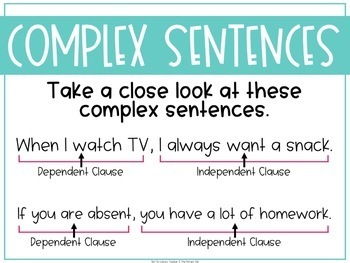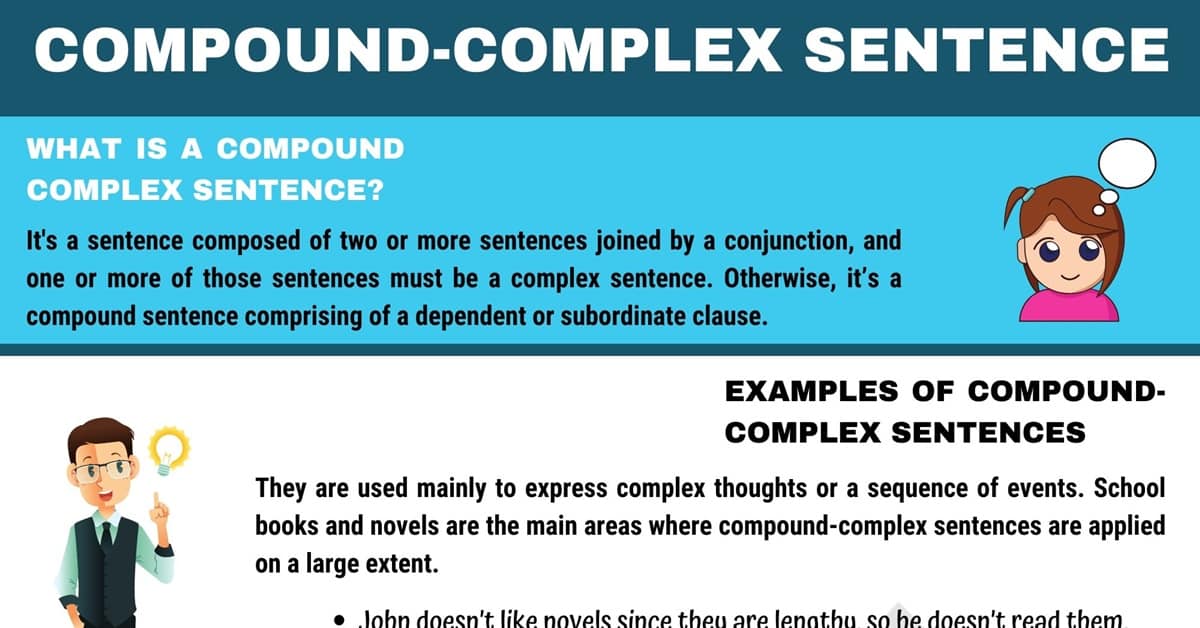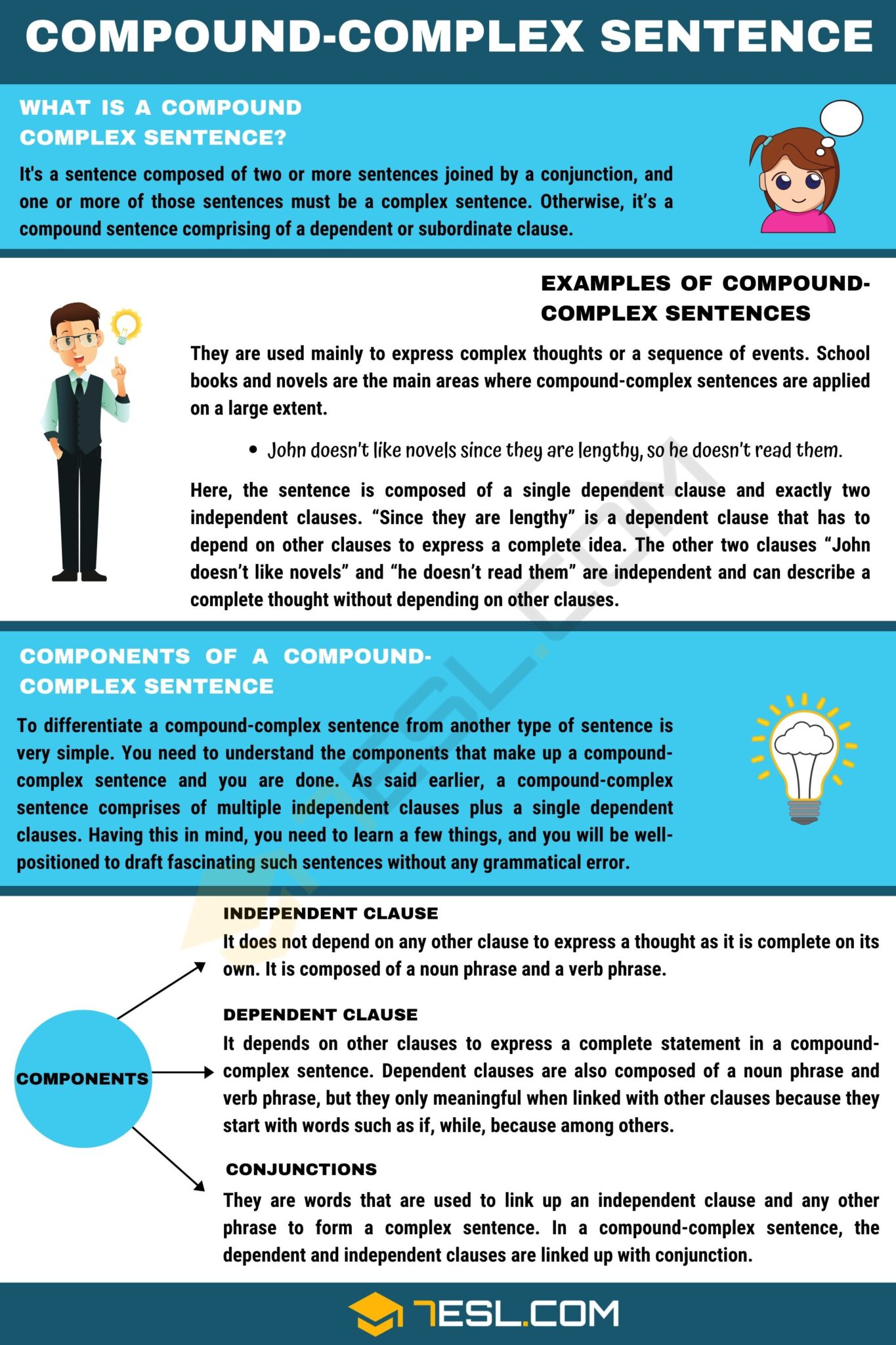Simple, Compound, Complex and Compound Complex Sentences, Definition and Examples
a sentence consisting of only one clause, with a single subject and predicate.
A simple sentence has the most basic elements that make it a sentence: a subject, a verb, and a completed thought. Examples of simple sentences include the following: Joe waited for the train. The train was late.

Question
Five simple sentences about cat
Solution
The cat is a very adorable animal. Cats can be kept as pets in our houses as well. Their claws are quite sharp. They have extremely strong nocturnal eyesight. They also have two tiny ears. Cats have a short tail that helps them keep their balance when walking. The cat is an omnivorous mammal. This indicates that they consume both meat and veggies.
Sentences: Simple, Compound, and Complex
A common weakness in writing is the lack of varied sentences. Becoming aware of three general types of sentences–simple, compound, and complex–can help you vary the sentences in your writing.
The most effective writing uses a variety of the sentence types explained below.
1. Simple Sentences
A simple sentence has the most basic elements that make it a sentence: a subject, a verb, and a completed thought.
Examples of simple sentences include the following:
- Joe waited for the train.
“Joe” = subject, “waited” = verb
- The train was late.
“The train” = subject, “was” = verb
- Mary and Samantha took the bus.
“Mary and Samantha” = compound subject, “took” = verb
- I looked for Mary and Samantha at the bus station.
“I” = subject, “looked” = verb
- Mary and Samantha arrived at the bus station early but waited until noon for the bus.
“Mary and Samantha” = compound subject, “arrived” and “waited” = compound verb
Tip: If you use many simple sentences in an essay, you should consider revising some of the sentences into compound or complex sentences (explained below).
The use of compound subjects, compound verbs, prepositional phrases (such as “at the bus station”), and other elements help lengthen simple sentences, but simple sentences often are short. The use of too many simple sentences can make writing “choppy” and can prevent the writing from flowing smoothly.
A simple sentence can also be referred to as an independent clause. It is referred to as “independent” because, while it might be part of a compound or complex sentence, it can also stand by itself as a complete sentence.
2. Compound Sentences
A compound sentence refers to a sentence made up of two independent clauses (or complete sentences) connected to one another with a coordinating conjunction. Coordinating conjunctions are easy to remember if you think of the words “FAN BOYS”:
- For
- And
- Nor
- But
- Or
- Yet
- So
Examples of compound sentences include the following:
- Joe waited for the train, but the train was late.
- I looked for Mary and Samantha at the bus station, but they arrived at the station before noon and left on the bus before I arrived.
- Mary and Samantha arrived at the bus station before noon, and they left on the bus before I arrived.
- Mary and Samantha left on the bus before I arrived, so I did not see them at the bus station.
Tip: If you rely heavily on compound sentences in an essay, you should consider revising some of them into complex sentences (explained below).
Coordinating conjunctions are useful for connecting sentences, but compound sentences often are overused. While coordinating conjunctions can indicate some type of relationship between the two independent clauses in the sentence, they sometimes do not indicate much of a relationship. The word “and,” for example, only adds one independent clause to another, without indicating how the two parts of a sentence are logically related. Too many compound sentences that use “and” can weaken writing.
Clearer and more specific relationships can be established through the use of complex sentences.

3. Complex Sentences
A complex sentence is made up of an independent clause and one or more dependent clauses connected to it. A dependent clause is similar to an independent clause, or complete sentence, but it lacks one of the elements that would make it a complete sentence.
Examples of dependent clauses include the following:
- because Mary and Samantha arrived at the bus station before noon
- while he waited at the train station
- after they left on the bus
Dependent clauses such as those above cannot stand alone as a sentence, but they can be added to an independent clause to form a complex sentence.
Dependent clauses begin with subordinating conjunctions. Below are some of the most common subordinating conjunctions:
- after
- although
- as
- because
- before
- even though
- if
- since
- though
- unless
- until
- when
- whenever
- whereas
- wherever
- while
A complex sentence joins an independent clause with one or more dependent clauses.
The dependent clauses can go first in the sentence, followed by the independent clause, as in the following:
Tip: When the dependent clause comes first, a comma should be used to separate the two clauses.
- Because Mary and Samantha arrived at the bus station before noon, I did not see them at the station.
- While he waited at the train station, Joe realized that the train was late.
- After they left on the bus, Mary and Samantha realized that Joe was waiting at the train station.
Conversely, the independent clauses can go first in the sentence, followed by the dependent clause, as in the following:
Tip: When the independent clause comes first, a comma should not be used to separate the two clauses.
- I did not see them at the station because Mary and Samantha arrived at the bus station before noon.
- Joe realized that the train was late while he waited at the train station.
- Mary and Samantha realized that Joe was waiting at the train station after they left on the bus.
Complex sentences are often more effective than compound sentences because a complex sentence indicates clearer and more specific relationships between the main parts of the sentence. The word “before,” for instance, tells readers that one thing occurs before another. A word such as “although” conveys a more complex relationship than a word such as “and” conveys.



The term periodic sentence is used to refer to a complex sentence beginning with a dependent clause and ending with an independent clause, as in “While he waited at the train station, Joe realized that the train was late.”
Periodic sentences can be especially effective because the completed thought occurs at the end of it, so the first part of the sentence can build up to the meaning that comes at the end.
Beginning Sentences with “And” or “Because”
Should you begin a sentence with “and” or “but” (or one of the other coordinating conjunctions)?
The short answer is “no.” You should avoid beginning a sentence with “and,” “or,” “but,” or the other coordinating conjunctions. These words generally are used to join together parts of a sentence, not to begin a new sentence.
However, such sentences can be used effectively. Because sentences beginning with these words stand out, they are sometimes used for emphasis. If you use sentences beginning with one of the coordinating conjunctions, you should use these sentences sparingly and carefully.
Should you begin a sentence with “because”?
There is nothing wrong with beginning a sentence with “because.”
Perhaps some students are told not to begin a sentence with “because” to avoid sentence fragments (something like “Because Mary and Samantha arrived at the bus station before noon” is a sentence fragment), but it is perfectly acceptable to begin a sentence with “because” as long as the sentence is complete (as in “Because Mary and Samantha arrived at the bus station before noon, I did not see them at the station.”)
Compound Complex Sentences:-
A complex sentence combines a dependent clause with an independent clause. When the dependent clause is placed before the independent clause, the two clauses are divided by a comma; otherwise, no punctuation is necessary. Example: Because the soup was too cold, I warmed it in the microwave.


 Pin
Pin
Compound-Complex Sentence Definition and Useful Examples
1.1k
SHARES
To have a clear picture in mind about a compound-complex sentence, we need first to understand what a compound and complex sentence entail. A compound sentence is composed of two simple sentences connected by a conjunction. A complex sentence, on the other hand, is composed of a simple sentence and a subordinate or dependent clause. A dependent clause, also known as the subordinate, is composed of a subject and a verb, but it cannot express a complete thought without depending on other clauses.
Compound-Complex Sentence
What is a Compound Complex Sentence?
It’s a sentence composed of two or more sentences joined by a conjunction, and one or more of those sentences must be a complex sentence.
Otherwise, it’s a compound sentence comprising of a dependent or subordinate clause.
Examples of Compound-Complex Sentences
They are used mainly to express complex thoughts or a sequence of events. School books and novels are the main areas where compound-complex sentences are applied on a large extent. Let’s look at the following examples to get to learn what’s entailed in this type of sentence.
- John doesn’t like novels since they are lengthy, so he doesn’t read them.
Here, the sentence is composed of a single dependent clause and exactly two independent clauses. “Since they are lengthy” is a dependent clause that has to depend on other clauses to express a complete idea. The other two clauses “John doesn’t like novels” and “he doesn’t read them” are independent and can describe a complete thought without depending on other clauses.
- The parents started fighting, so the kids disappeared, and I was unable to withstand, so I remained calm.
This sentence is composed of multiple clauses, but the rules are still the same.
The independent clauses are complete sentences, whereas dependent clauses are incomplete.
The above examples use conjunctions to join the clauses together.
Components of a Compound-Complex Sentence
To differentiate a compound-complex sentence from another type of sentence is very simple. You need to understand the components that make up a compound-complex sentence and you are done. As said earlier, a compound-complex sentence comprises of multiple independent clauses plus a single dependent clauses. Having this in mind, you need to learn a few things, and you will be well-positioned to draft fascinating such sentences without any grammatical error.
Independent Clause
It does not depend on any other clause to express a thought as it is complete on its own. It is composed of a noun phrase and a verb phrase. In this case, a noun phrase is a subject, and the verb phrase is a predicate that modifies the subject.
In this type of sentence, the independent clauses are referred to as coordinate clauses.
Coordinating conjunctions are used to link up two or more independent clauses, as illustrated in the following examples:
- Though he was late, James knew he had to complete the assignment, and he quickly went to the study room.
- She loves listening to music, but she can’t dance when music is played.
Here “and” and “but” are the conjunctions used to link up the independent clauses in the above sentences.
Dependent Clause
It depends on other clauses to express a complete statement in a compound-complex sentence. Just like independent clauses, dependent clauses are also composed of a noun phrase and verb phrase, but they only meaningful when linked with other clauses because they start with words such as if, while, because among others.
In simple terms, they are designed to make a sentence much more meaningful.
In the example, “Though he was late” it describes why James was having a problem completing the assignment. It’s is meaningless without depending on an independent clause. The clause begins with the subordinate conjunction “Though”.
Conjunctions
They are words that are used to link up an independent clause and any other phrase to form a complex sentence. In a compound-complex sentence, the dependent and independent clauses are linked up with conjunction. The commonly used conjunctions are and, but, and or.
Coordinating conjunctions
They are designed to link up independent clauses and other simple phrases. The most used coordinating conjunctions are so, or, for, but, yet, and, and nor.
Always include compound-complex sentences in your writing to make it appealing and much more meaningful to your readers. By doing this you can be sure to attract more readers to your content because it is interesting and informative.
Compound Complex Sentence Infographic


